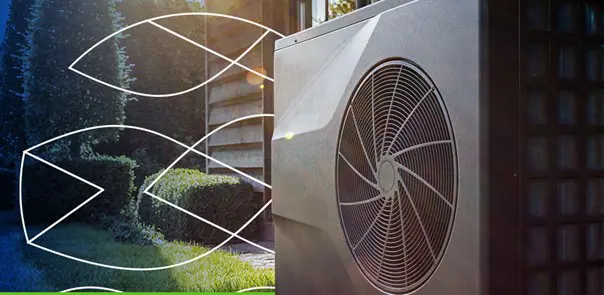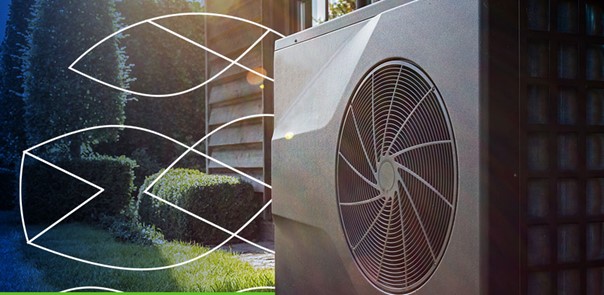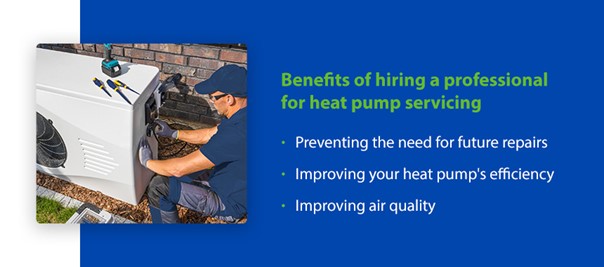

Heat pumps are an excellent way to heat or cool a home. Improving your heat pump’s efficiency is essential to reduce costs and ensure you can heat your home without putting too much strain on your system. A well-maintained heat pump will use less energy, prolonging its life span. Regularly cleaning and servicing your heat pump can prevent the need for future repairs, improve air quality and reduce your overall costs.
Properly caring for your heat pump is essential to get the most from your unit. Continue reading to learn more about heat pump maintenance and how you can keep yours in the best condition possible.
Proactive heat pump maintenance improves efficiency by ensuring all components work correctly. By having a professional inspection before extreme weather sets in, you can identify the necessary repairs to keep a heat pump running smoothly. Proactive maintenance also reduces the chance of requiring emergency service, which can be an inconvenience if your system doesn’t work correctly in winter or summer.
Routine maintenance has numerous benefits for heat pumps, including:
Your heat pump works hard to keep your home comfortable throughout the year, so taking care of it through regular maintenance is essential. Caring for your heat pump extends your unit’s life and overall efficiency.
You must regularly clean your heat pump to maintain its performance and airflow without damaging any components. Dirty components can cause a heat pump to fail, requiring costly repairs. You don’t want your heat pump to unexpectedly fail when you need it most and have to request emergency services during one of the busiest times of the year.
Before you start cleaning your heating pump, you should consult your owner’s manual for directions on how to do so. The general cleaning procedure is as follows:
You’ll want to use a microfiber cloth and a soap-and-water solution when cleaning. If you’re cleaning an outdoor unit, you can use a garden hose to remove dirt or debris. When using a hose, remember to hit the fins with the water dead on rather than at an angle.
Trained technicians typically service heat pumps every year. Some tasks an HVAC mechanic may perform include:
Troubleshooters may perform additional maintenance depending on your concerns regarding your heat pump, ensuring all components work correctly throughout the year. They can also diagnose problems and fix anything that needs service.

To maintain your heat pump’s efficiency and quality, an expert should always service it annually. Some of the benefits of hiring a professional include the following.
Air filters catch particles before they enter your indoor air supply, reducing the amount of dust and pollutants in your home. However, many homeowners overlook changing their heat pump air filters, which can cause them to become clogged with dirt and other particles.
Failing to switch out your air filters can adversely affect the air quality in your home. Dirty air filters also make it harder for your heat pump to work efficiently. The excess energy your heat pump uses to push air through your home can increase your utility bills. Regularly changing your air filters will reduce your energy costs and extend your HVAC equipment’s life span.
Generally, you’ll want to replace your air filters once every three months. However, if you have pets or a family member with respiratory illness, you should change your air filters more frequently, about once a month.
Apart from the maintenance tips mentioned above, you should follow a few additional tips to ensure your heat pump performs at maximum efficiency. For example, you’ll want to maintain clear airflow paths. Many factors can affect airflow, such as leaking ducts, improper installation and poor maintenance. One of the best ways to maintain clear airflow paths is to keep up with your maintenance and cleaning routine. You should also contact a professional duct cleaning service.
Heat pumps typically rise gradually to the desired temperature when set a degree or two above your home’s indoor temperature. If you set your heat pump more than three degrees above the temperature inside your home, it might start its emergency system to quickly attain your ideal temperature. The emergency system is less efficient than the heat pump, which can lead to higher energy costs.
You can use a programmable thermostat to improve your heat pump’s efficiency by gradually allowing it to reach the ideal temperature. You can program your thermostat to reach a specific temperature at specific parts of the day. Ideally, you’ll want to set the thermostat to 75 in the summer and 68 in the winter for the best energy efficiency, helping reduce costs.
Heat pump maintenance helps you save on energy costs, improves efficiency and maintains indoor air quality. If you need a professional to service your heat pump, Shipley Energy can help. We offer heat pump installation and repair services to help your unit last as long as possible. Trust us to keep up with your maintenance requirements to maximize your heat pump’s potential.
We can help you tackle any challenges with HVAC efficiency, reduced airflow, strange noises and more. Our technicians can diagnose any problems and recommend the best course for repairs. Contact us today to get started!